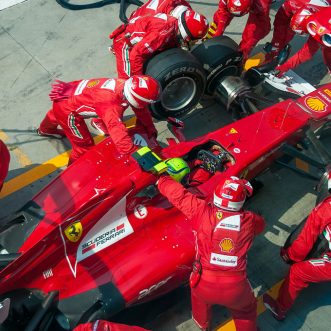
That Question
What question do you get asked over and over again about your product or service?
What could you do to save people having to ask it?
What could your people do with the time they spend answering it?

What question do you get asked over and over again about your product or service?
What could you do to save people having to ask it?
What could your people do with the time they spend answering it?

I have a weird habit.
If I’m in a loo where the toilet roll holder is empty, and there are toilet rolls around to refill it. I refill it.
It doesn’t matter whose loo it is. A client’s, a friend’s, a department store’s, a pub’s. I’m sat there anyway, the job needs doing, so I do it.
Imagine, if everyone did this, how much more comfortable office life would be?
A small example of what happens when responsible autonomy is paired with direct and immediate feedback.
Now imagine what your business could be like if you took this approach everywhere.

How does improvement happen?
First by collecting feedback, both quantitative and qualitative.
Then by looking at what that feedback might be telling you about what’s happened in the past, and what is likely to happen in the future if nothing changes.
Then by adjusting the system accordingly.
Your adjustments might be wrong of course, which is why it’s a good idea to keep them small until feedback shows you’re heading in the right direction.
Over time you’ll learn to keep it simple.
Then improvement will come naturally.

Back in February, I got involved in a project called ‘Connect the Dots’, an ancillary to The Carbon Almanac.
The idea was to take the well-researched facts, issues and solutions from the Almanac and connect them together visually, so that someone can see how they interact. More importantly, so someone can see how a single action can have multiple impacts.
We started with Solutions, because in spite of what we see and hear, they are already out there. People are already taking practical, unheroic, collective steps to change the systems that we have turned into traps.
We’re having a rest for a week, and then we’ll come back to it, perhaps with more people joining in. So it will continue to grow.
Yesterday the project went live.
Find it under ‘Extras’ at The Carbon Almanac.
It’s not finished – it never will be.
It’s not perfect – it never will be.
Hopefully it is inspiring enough to prompt more people to take action.
Together.
Connecting the dots.

At the beginning of this year, I got involved in writing a book. With at least 26 other people and a brilliant designer. All of us members of the ‘Like Hearted Leaders’.
Every week, on a Friday, we LHL’ers share a laugh, or a tear, or an insight. In spaces where we can think, question and learn. Where we meet and make friends with some wonderful, inspiring people.
Where we are like-hearted, but not necessarily like-minded, which makes it one of the most stimulating groups I’ve ever had the good fortune to be part of.
You can see that in our book: ‘On a Friday’. Now available on Amazon.
Written by us, for like-hearted (but not necessarily like-minded) leaders like you.

Corporations, being founded on a theory of Homo Economicus, naturally believe that when someone complains, they are merely seeking personal redress.
That’s true, but it isn’t the whole story.
Most often people want recognition of their own case AND to make sure it doesn’t happen to someone else. Sometimes people just want to make sure the mistake isn’t repeated.
That means “Sorry” is never enough, even when accompanied by compensation. What people really want to see is evidence that the mistake is being rectified. That systems and process are changed to ensure it can’t be repeated.
Otherwise, the only conclusion to be drawn is that it wasn’t a mistake, but policy. And compensation a bribe to keep your mouth shut.
Check out this Twitter thread from George Monbiot to see what I mean.
And this thread for the complaint that started it.

In the late 18th century it was tough to be a sailor in the Royal Navy. Discipline was harsh, pay was low, the food was terrible and battles were deadly. Especially if you were part of a gun crew.
Firing a cannon was far from simple, it took several steps and required good co-ordination and careful timing. The equivalent of a modern Formula1 pitstop. Plus of course all the time you were firing, the enemy was firing at you, shattering the hull of your own ship into lethal splinters.
The bosses expected gun crews to work by instinct. Their thinking was that in the midst of battle, when your life depended on it you would naturally do the best job you could.
A new boss changed all that. His radical idea was to look at what the best gun crews did, then train every crew to work as they did, practicing until every crew performed the best it could – consistently and on purpose.
“A waste of good ammunition” said his bosses.
Horatio Nelson insisted and got his way.
The rest as they say, is history.
Instinct can get you a long way, but if you want to go further, you need intention.
Discipline makes Daring possible.

Eggs may not seem like a big deal, but when it comes to dealing with climate change, every little helps, especially when done by a lot of people.
Here are 4 egg producers doing something towards reducing the impact factory egg farming has on our planet.
And here are a few questions you can start to ask about all the small things you buy:
It’s not too late to take meaningful action to save our future on the planet.
Before you can act, you need to be informed. The market won’t do this. Especially when it isn’t working properly and a few mega-companies control huge swathes of production.
We have to inform ourselves. Then tell our friends.
I learned about these egg producers through ‘The Daily Difference‘ from The Carbon Almanac. Why not sign up yourself?
Contrary to what we’re told, it’s not too late, provided we all take action.

It was almost a throwaway remark from Paul Smith.
“What AI is interesting for at the moment is to generate starting points for your own creativity.“
Clink.
The pieces in my kaleidoscope shifted slightly.
We see the world through the lenses of what we know, what we believe and what we feel. We can’t help that.
So it is lovely to have someone nudge the kaleidoscope occasionally, and give us a change of view. Especially when that view is of something you are slightly fearful of.
That thing you’re worried about for your business? Have a conversation with an enthusiast, and see what happens to your kaleidoscope.
It can’t hurt. It might help. It will definitely change your view.

“This is not a democracy, it’s a benevolent dictatorship.”
As kids we occasionally questioned the benevolence. My mother must have questioned the dictatorship. Often.
Because more often than we sullenly submitted to some arbitrary (to us) command, we found ways to do exactly what we wanted. Mostly by simply doing them out of sight.
Looking back, its clear that much of this dictatorship came from inability, not unwillingness. We simply couldn’t afford stuff. But talking about this would have meant explaining why we couldn’t afford it, which in a nutshell was because there were too many of us for the income. And my parents never wanted any of us to feel unwanted or unloved.
Still, a bit of participatory democracy might have made things easier. We could have come up with ideas for saving money and priorities for spending it that we all agreed on.
It’s often said that small businesses are like families. And as ‘The Boss’, it seems easiest to run things as a ‘benevolent dictatorship’. But how much is going on out of your sight? How many good ideas are you losing? How much help are you missing out on?
Dictatorships, no matter how benevolent, aren’t just unfair. They’re inefficient and fragile. And in the long run, unsustainable.
Participation makes daring scalable.